Impact of Power, Culture, and Politics on Morrison's Behavior
VerifiedAdded on 2022/12/28
|14
|4798
|43
Report
AI Summary
This report provides an in-depth analysis of organizational behavior within Morrison's, a prominent UK supermarket chain. It explores the influence of power, culture, and politics on individual and team performance, utilizing models like Charles Handy's cultural framework and French and Raven's power types. The report examines both process and content theories, including Maslow's hierarchy of needs and Adams' equity theory, along with various motivational techniques, to achieve organizational goals. Furthermore, it critically evaluates the impact of these factors on worker behavior and performance, while also defining the characteristics of effective and ineffective teams. The report concludes with a discussion of organizational behavior concepts and philosophies, offering insights into how these elements shape employee actions and overall business outcomes within the context of Morrison's.
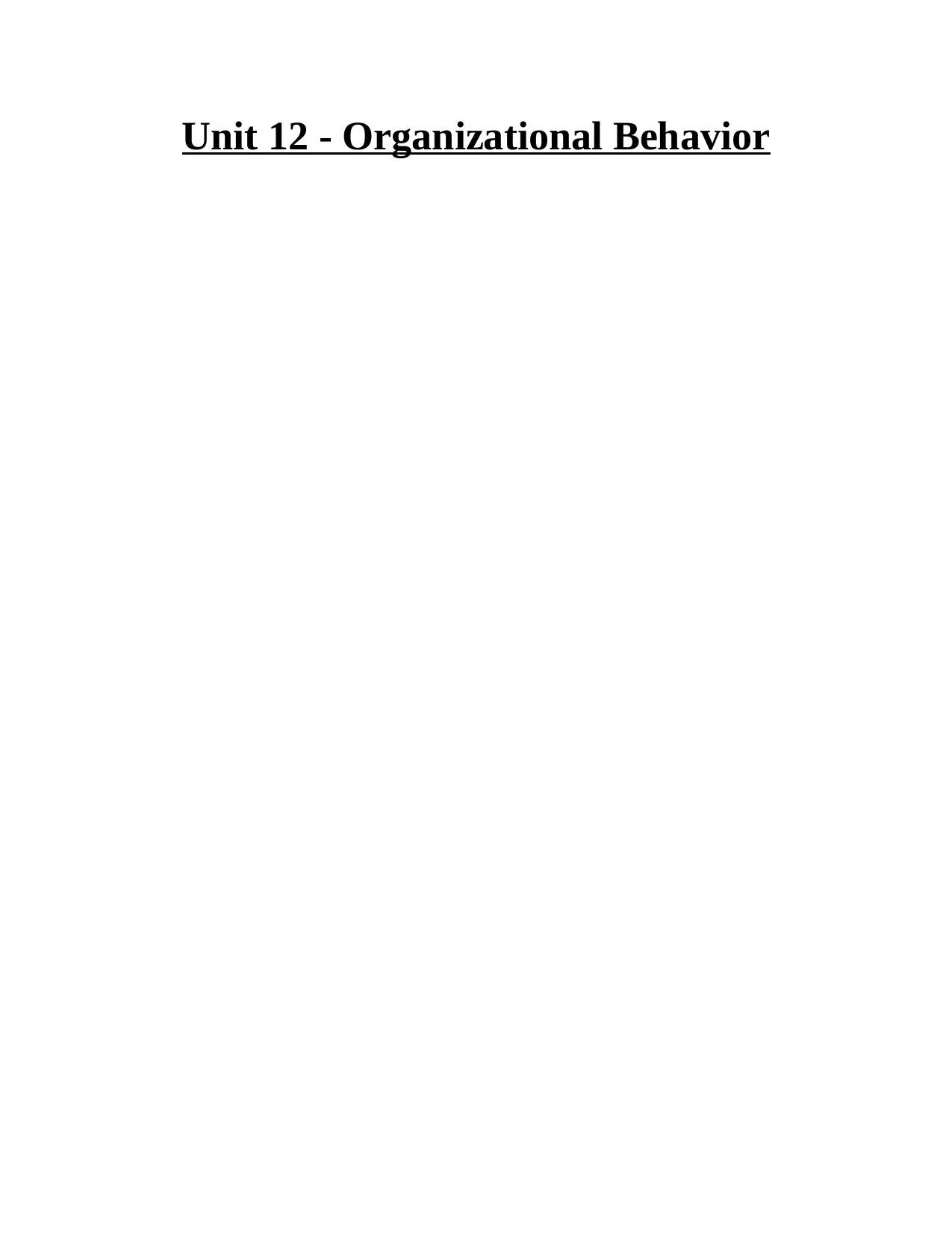
Unit 12 - Organizational Behavior
Paraphrase This Document
Need a fresh take? Get an instant paraphrase of this document with our AI Paraphraser
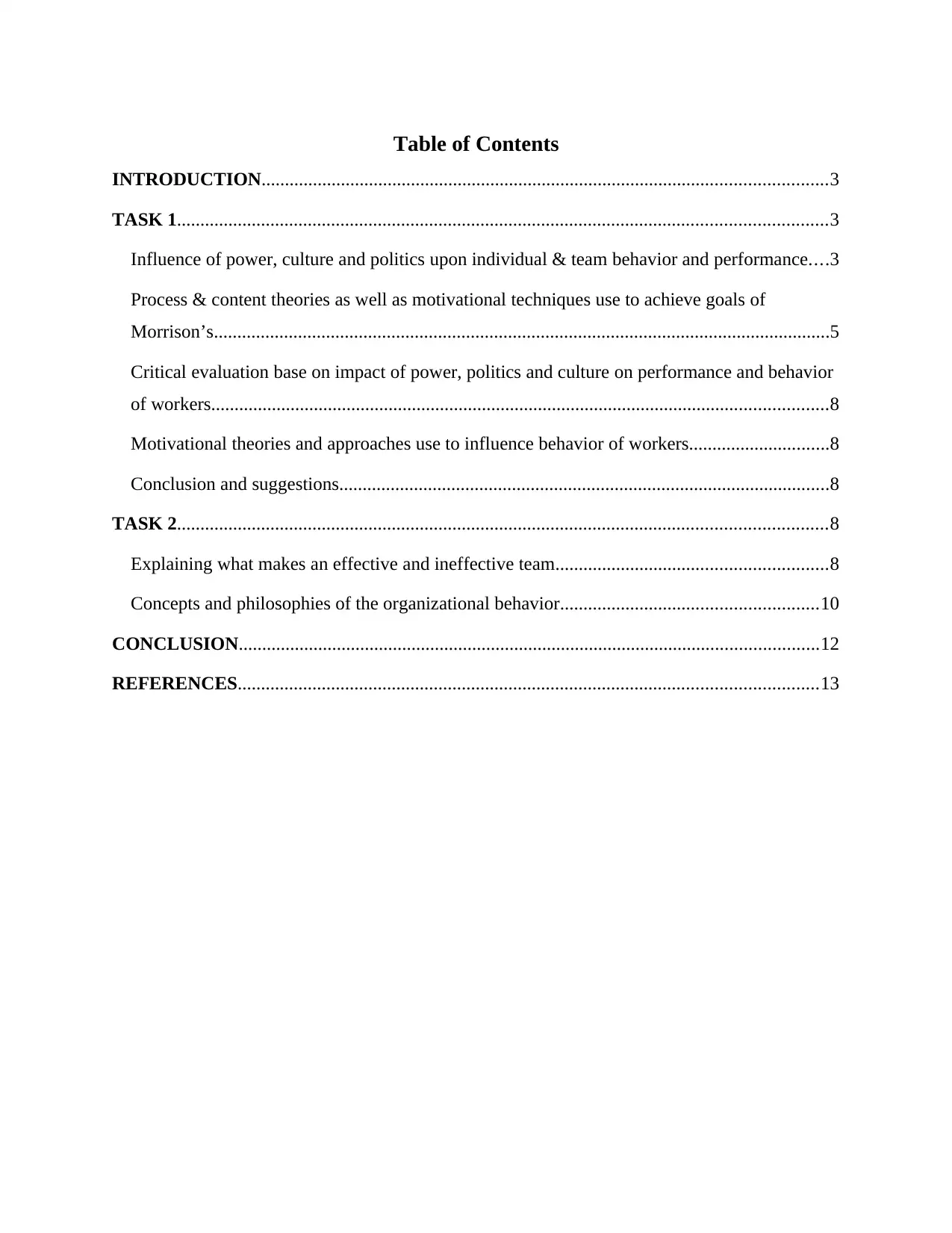
Table of Contents
INTRODUCTION.........................................................................................................................3
TASK 1...........................................................................................................................................3
Influence of power, culture and politics upon individual & team behavior and performance....3
Process & content theories as well as motivational techniques use to achieve goals of
Morrison’s....................................................................................................................................5
Critical evaluation base on impact of power, politics and culture on performance and behavior
of workers....................................................................................................................................8
Motivational theories and approaches use to influence behavior of workers..............................8
Conclusion and suggestions.........................................................................................................8
TASK 2...........................................................................................................................................8
Explaining what makes an effective and ineffective team..........................................................8
Concepts and philosophies of the organizational behavior.......................................................10
CONCLUSION............................................................................................................................12
REFERENCES............................................................................................................................13
INTRODUCTION.........................................................................................................................3
TASK 1...........................................................................................................................................3
Influence of power, culture and politics upon individual & team behavior and performance....3
Process & content theories as well as motivational techniques use to achieve goals of
Morrison’s....................................................................................................................................5
Critical evaluation base on impact of power, politics and culture on performance and behavior
of workers....................................................................................................................................8
Motivational theories and approaches use to influence behavior of workers..............................8
Conclusion and suggestions.........................................................................................................8
TASK 2...........................................................................................................................................8
Explaining what makes an effective and ineffective team..........................................................8
Concepts and philosophies of the organizational behavior.......................................................10
CONCLUSION............................................................................................................................12
REFERENCES............................................................................................................................13
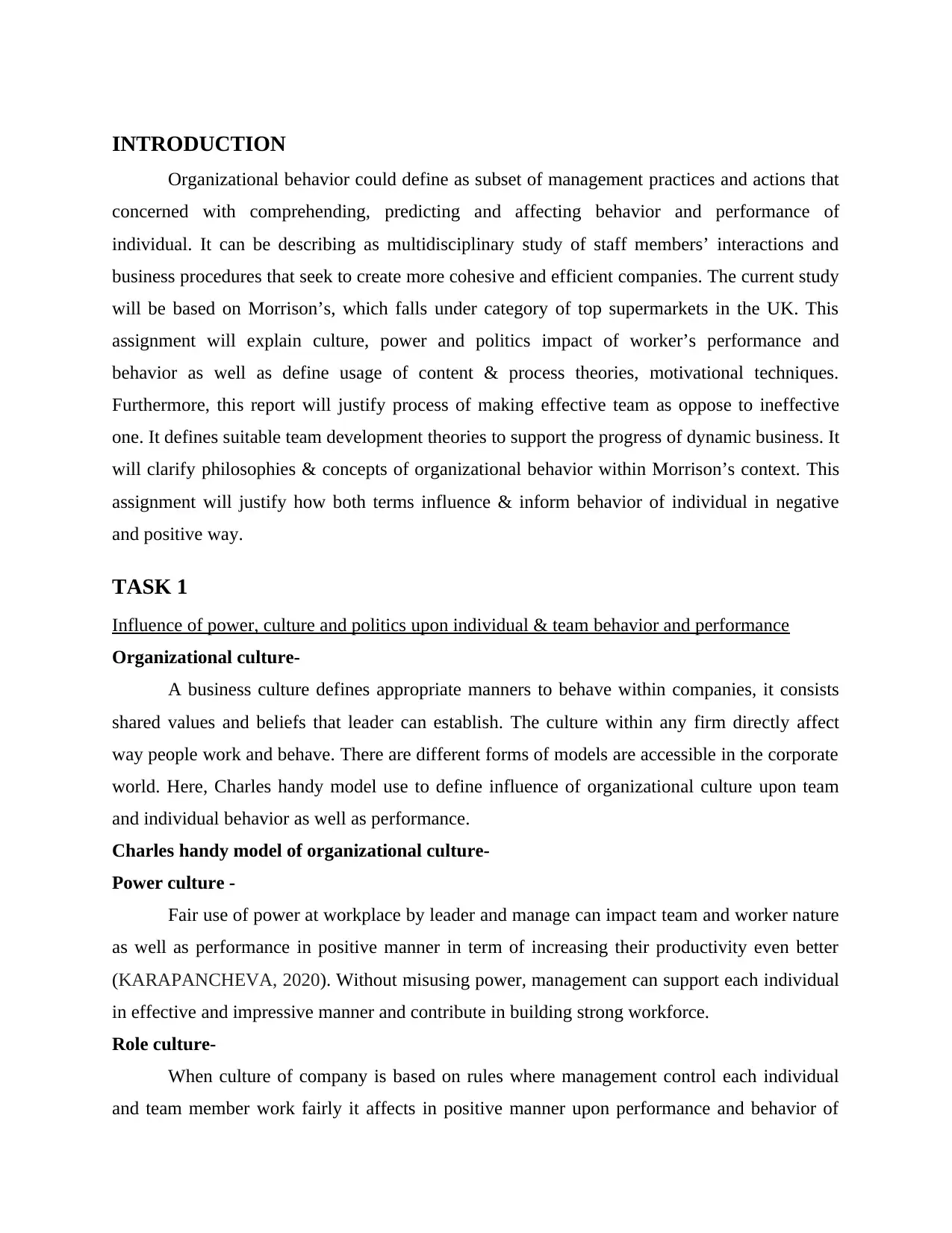
INTRODUCTION
Organizational behavior could define as subset of management practices and actions that
concerned with comprehending, predicting and affecting behavior and performance of
individual. It can be describing as multidisciplinary study of staff members’ interactions and
business procedures that seek to create more cohesive and efficient companies. The current study
will be based on Morrison’s, which falls under category of top supermarkets in the UK. This
assignment will explain culture, power and politics impact of worker’s performance and
behavior as well as define usage of content & process theories, motivational techniques.
Furthermore, this report will justify process of making effective team as oppose to ineffective
one. It defines suitable team development theories to support the progress of dynamic business. It
will clarify philosophies & concepts of organizational behavior within Morrison’s context. This
assignment will justify how both terms influence & inform behavior of individual in negative
and positive way.
TASK 1
Influence of power, culture and politics upon individual & team behavior and performance
Organizational culture-
A business culture defines appropriate manners to behave within companies, it consists
shared values and beliefs that leader can establish. The culture within any firm directly affect
way people work and behave. There are different forms of models are accessible in the corporate
world. Here, Charles handy model use to define influence of organizational culture upon team
and individual behavior as well as performance.
Charles handy model of organizational culture-
Power culture -
Fair use of power at workplace by leader and manage can impact team and worker nature
as well as performance in positive manner in term of increasing their productivity even better
(KARAPANCHEVA, 2020). Without misusing power, management can support each individual
in effective and impressive manner and contribute in building strong workforce.
Role culture-
When culture of company is based on rules where management control each individual
and team member work fairly it affects in positive manner upon performance and behavior of
Organizational behavior could define as subset of management practices and actions that
concerned with comprehending, predicting and affecting behavior and performance of
individual. It can be describing as multidisciplinary study of staff members’ interactions and
business procedures that seek to create more cohesive and efficient companies. The current study
will be based on Morrison’s, which falls under category of top supermarkets in the UK. This
assignment will explain culture, power and politics impact of worker’s performance and
behavior as well as define usage of content & process theories, motivational techniques.
Furthermore, this report will justify process of making effective team as oppose to ineffective
one. It defines suitable team development theories to support the progress of dynamic business. It
will clarify philosophies & concepts of organizational behavior within Morrison’s context. This
assignment will justify how both terms influence & inform behavior of individual in negative
and positive way.
TASK 1
Influence of power, culture and politics upon individual & team behavior and performance
Organizational culture-
A business culture defines appropriate manners to behave within companies, it consists
shared values and beliefs that leader can establish. The culture within any firm directly affect
way people work and behave. There are different forms of models are accessible in the corporate
world. Here, Charles handy model use to define influence of organizational culture upon team
and individual behavior as well as performance.
Charles handy model of organizational culture-
Power culture -
Fair use of power at workplace by leader and manage can impact team and worker nature
as well as performance in positive manner in term of increasing their productivity even better
(KARAPANCHEVA, 2020). Without misusing power, management can support each individual
in effective and impressive manner and contribute in building strong workforce.
Role culture-
When culture of company is based on rules where management control each individual
and team member work fairly it affects in positive manner upon performance and behavior of
⊘ This is a preview!⊘
Do you want full access?
Subscribe today to unlock all pages.

Trusted by 1+ million students worldwide
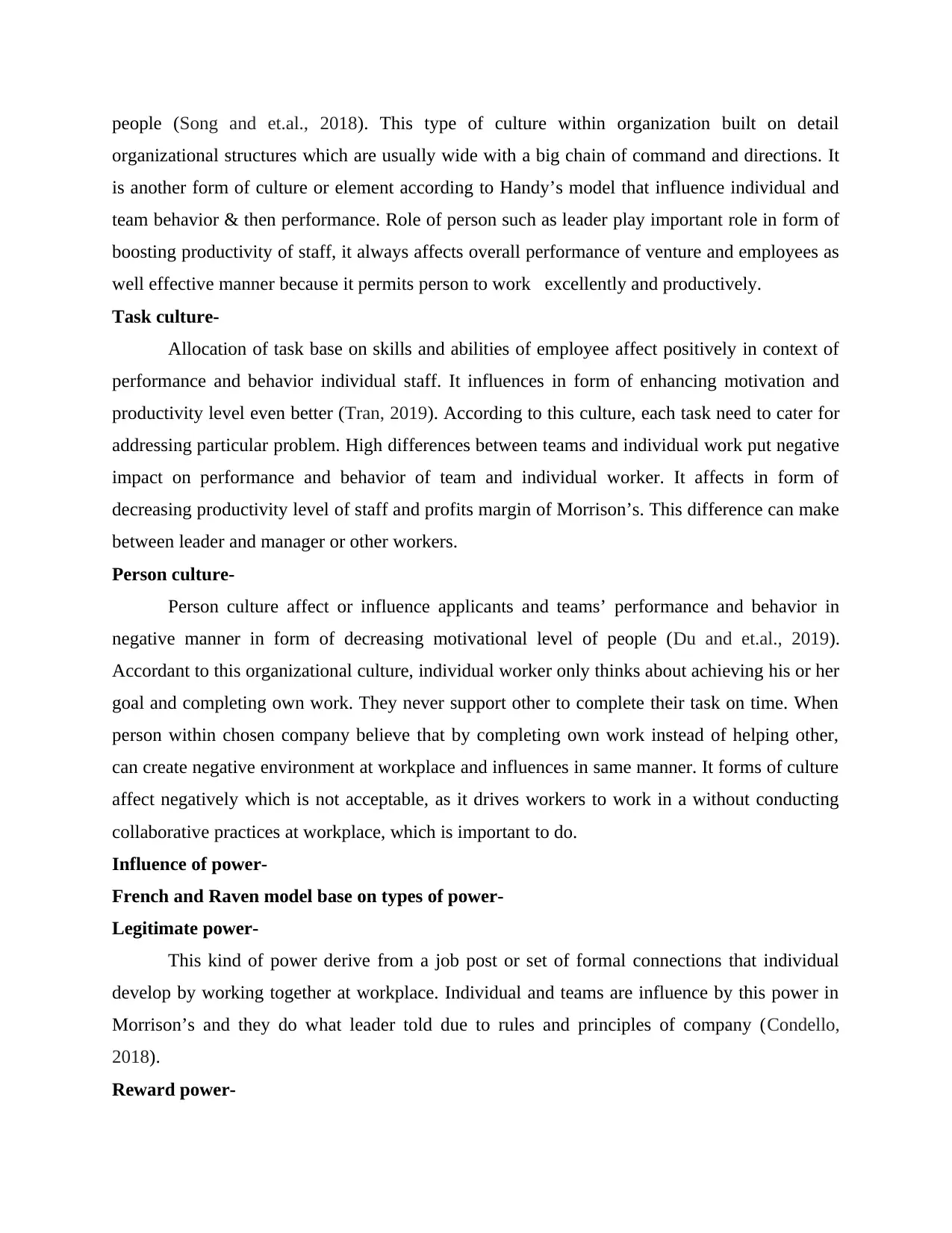
people (Song and et.al., 2018). This type of culture within organization built on detail
organizational structures which are usually wide with a big chain of command and directions. It
is another form of culture or element according to Handy’s model that influence individual and
team behavior & then performance. Role of person such as leader play important role in form of
boosting productivity of staff, it always affects overall performance of venture and employees as
well effective manner because it permits person to work excellently and productively.
Task culture-
Allocation of task base on skills and abilities of employee affect positively in context of
performance and behavior individual staff. It influences in form of enhancing motivation and
productivity level even better (Tran, 2019). According to this culture, each task need to cater for
addressing particular problem. High differences between teams and individual work put negative
impact on performance and behavior of team and individual worker. It affects in form of
decreasing productivity level of staff and profits margin of Morrison’s. This difference can make
between leader and manager or other workers.
Person culture-
Person culture affect or influence applicants and teams’ performance and behavior in
negative manner in form of decreasing motivational level of people (Du and et.al., 2019).
Accordant to this organizational culture, individual worker only thinks about achieving his or her
goal and completing own work. They never support other to complete their task on time. When
person within chosen company believe that by completing own work instead of helping other,
can create negative environment at workplace and influences in same manner. It forms of culture
affect negatively which is not acceptable, as it drives workers to work in a without conducting
collaborative practices at workplace, which is important to do.
Influence of power-
French and Raven model base on types of power-
Legitimate power-
This kind of power derive from a job post or set of formal connections that individual
develop by working together at workplace. Individual and teams are influence by this power in
Morrison’s and they do what leader told due to rules and principles of company (Condello,
2018).
Reward power-
organizational structures which are usually wide with a big chain of command and directions. It
is another form of culture or element according to Handy’s model that influence individual and
team behavior & then performance. Role of person such as leader play important role in form of
boosting productivity of staff, it always affects overall performance of venture and employees as
well effective manner because it permits person to work excellently and productively.
Task culture-
Allocation of task base on skills and abilities of employee affect positively in context of
performance and behavior individual staff. It influences in form of enhancing motivation and
productivity level even better (Tran, 2019). According to this culture, each task need to cater for
addressing particular problem. High differences between teams and individual work put negative
impact on performance and behavior of team and individual worker. It affects in form of
decreasing productivity level of staff and profits margin of Morrison’s. This difference can make
between leader and manager or other workers.
Person culture-
Person culture affect or influence applicants and teams’ performance and behavior in
negative manner in form of decreasing motivational level of people (Du and et.al., 2019).
Accordant to this organizational culture, individual worker only thinks about achieving his or her
goal and completing own work. They never support other to complete their task on time. When
person within chosen company believe that by completing own work instead of helping other,
can create negative environment at workplace and influences in same manner. It forms of culture
affect negatively which is not acceptable, as it drives workers to work in a without conducting
collaborative practices at workplace, which is important to do.
Influence of power-
French and Raven model base on types of power-
Legitimate power-
This kind of power derive from a job post or set of formal connections that individual
develop by working together at workplace. Individual and teams are influence by this power in
Morrison’s and they do what leader told due to rules and principles of company (Condello,
2018).
Reward power-
Paraphrase This Document
Need a fresh take? Get an instant paraphrase of this document with our AI Paraphraser
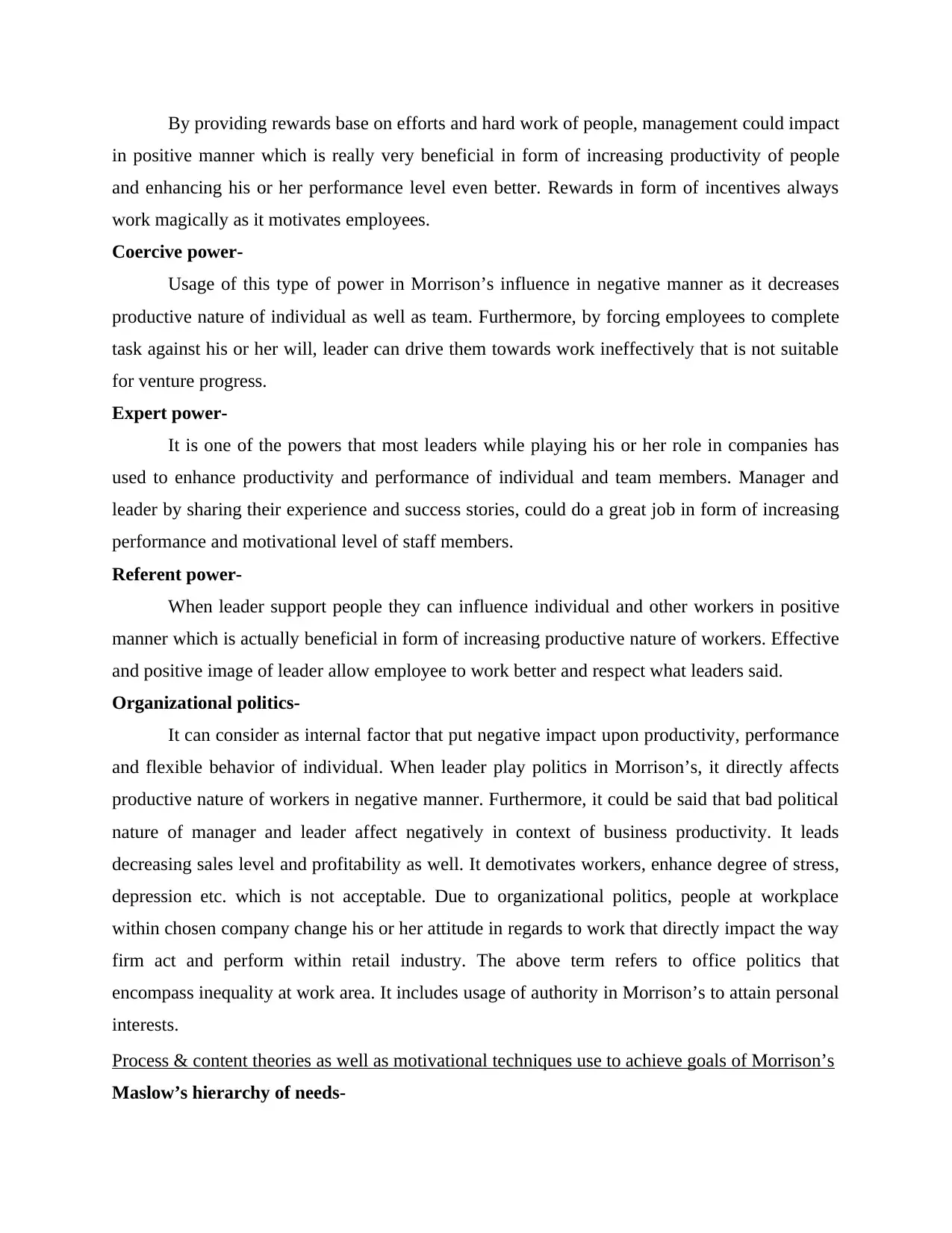
By providing rewards base on efforts and hard work of people, management could impact
in positive manner which is really very beneficial in form of increasing productivity of people
and enhancing his or her performance level even better. Rewards in form of incentives always
work magically as it motivates employees.
Coercive power-
Usage of this type of power in Morrison’s influence in negative manner as it decreases
productive nature of individual as well as team. Furthermore, by forcing employees to complete
task against his or her will, leader can drive them towards work ineffectively that is not suitable
for venture progress.
Expert power-
It is one of the powers that most leaders while playing his or her role in companies has
used to enhance productivity and performance of individual and team members. Manager and
leader by sharing their experience and success stories, could do a great job in form of increasing
performance and motivational level of staff members.
Referent power-
When leader support people they can influence individual and other workers in positive
manner which is actually beneficial in form of increasing productive nature of workers. Effective
and positive image of leader allow employee to work better and respect what leaders said.
Organizational politics-
It can consider as internal factor that put negative impact upon productivity, performance
and flexible behavior of individual. When leader play politics in Morrison’s, it directly affects
productive nature of workers in negative manner. Furthermore, it could be said that bad political
nature of manager and leader affect negatively in context of business productivity. It leads
decreasing sales level and profitability as well. It demotivates workers, enhance degree of stress,
depression etc. which is not acceptable. Due to organizational politics, people at workplace
within chosen company change his or her attitude in regards to work that directly impact the way
firm act and perform within retail industry. The above term refers to office politics that
encompass inequality at work area. It includes usage of authority in Morrison’s to attain personal
interests.
Process & content theories as well as motivational techniques use to achieve goals of Morrison’s
Maslow’s hierarchy of needs-
in positive manner which is really very beneficial in form of increasing productivity of people
and enhancing his or her performance level even better. Rewards in form of incentives always
work magically as it motivates employees.
Coercive power-
Usage of this type of power in Morrison’s influence in negative manner as it decreases
productive nature of individual as well as team. Furthermore, by forcing employees to complete
task against his or her will, leader can drive them towards work ineffectively that is not suitable
for venture progress.
Expert power-
It is one of the powers that most leaders while playing his or her role in companies has
used to enhance productivity and performance of individual and team members. Manager and
leader by sharing their experience and success stories, could do a great job in form of increasing
performance and motivational level of staff members.
Referent power-
When leader support people they can influence individual and other workers in positive
manner which is actually beneficial in form of increasing productive nature of workers. Effective
and positive image of leader allow employee to work better and respect what leaders said.
Organizational politics-
It can consider as internal factor that put negative impact upon productivity, performance
and flexible behavior of individual. When leader play politics in Morrison’s, it directly affects
productive nature of workers in negative manner. Furthermore, it could be said that bad political
nature of manager and leader affect negatively in context of business productivity. It leads
decreasing sales level and profitability as well. It demotivates workers, enhance degree of stress,
depression etc. which is not acceptable. Due to organizational politics, people at workplace
within chosen company change his or her attitude in regards to work that directly impact the way
firm act and perform within retail industry. The above term refers to office politics that
encompass inequality at work area. It includes usage of authority in Morrison’s to attain personal
interests.
Process & content theories as well as motivational techniques use to achieve goals of Morrison’s
Maslow’s hierarchy of needs-
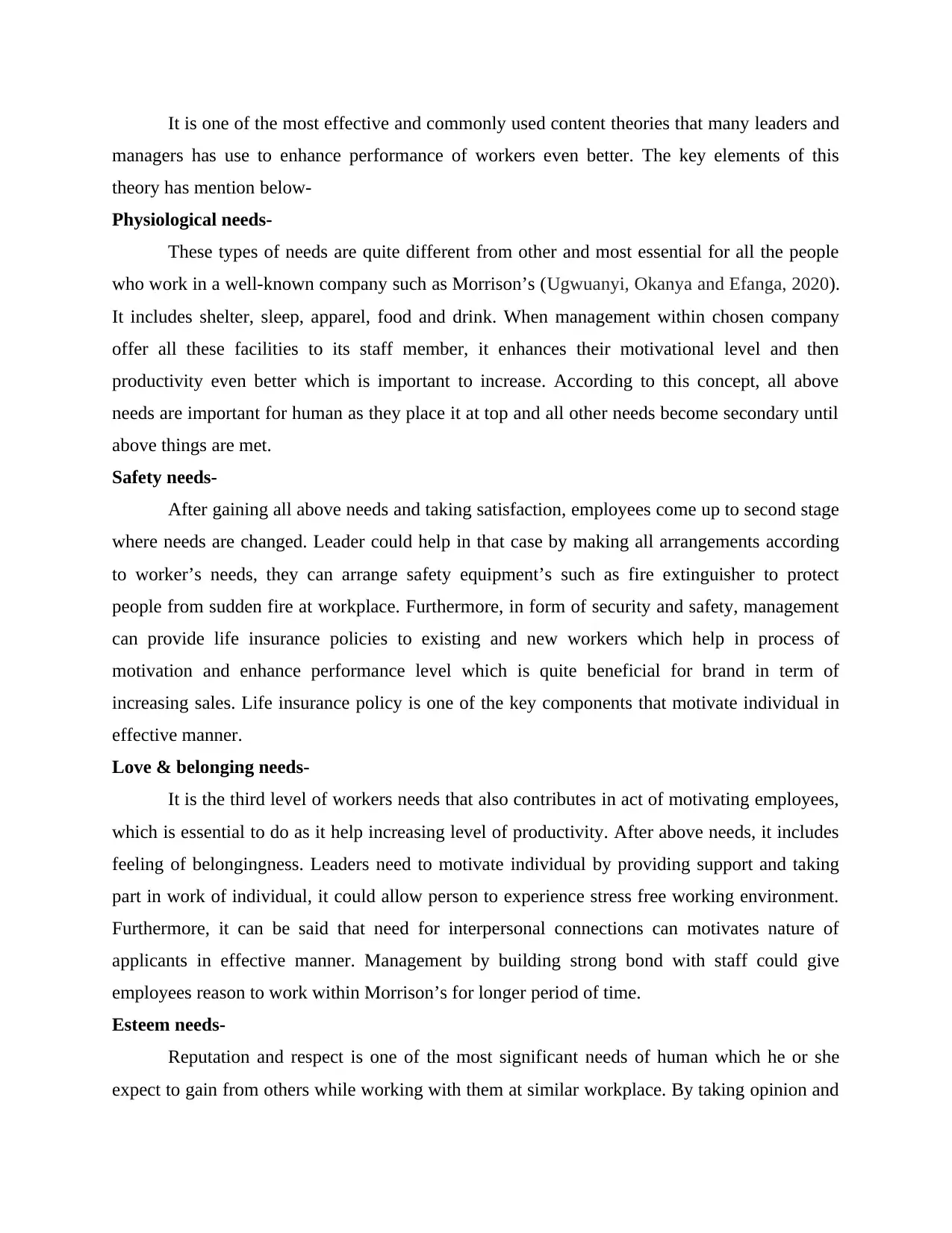
It is one of the most effective and commonly used content theories that many leaders and
managers has use to enhance performance of workers even better. The key elements of this
theory has mention below-
Physiological needs-
These types of needs are quite different from other and most essential for all the people
who work in a well-known company such as Morrison’s (Ugwuanyi, Okanya and Efanga, 2020).
It includes shelter, sleep, apparel, food and drink. When management within chosen company
offer all these facilities to its staff member, it enhances their motivational level and then
productivity even better which is important to increase. According to this concept, all above
needs are important for human as they place it at top and all other needs become secondary until
above things are met.
Safety needs-
After gaining all above needs and taking satisfaction, employees come up to second stage
where needs are changed. Leader could help in that case by making all arrangements according
to worker’s needs, they can arrange safety equipment’s such as fire extinguisher to protect
people from sudden fire at workplace. Furthermore, in form of security and safety, management
can provide life insurance policies to existing and new workers which help in process of
motivation and enhance performance level which is quite beneficial for brand in term of
increasing sales. Life insurance policy is one of the key components that motivate individual in
effective manner.
Love & belonging needs-
It is the third level of workers needs that also contributes in act of motivating employees,
which is essential to do as it help increasing level of productivity. After above needs, it includes
feeling of belongingness. Leaders need to motivate individual by providing support and taking
part in work of individual, it could allow person to experience stress free working environment.
Furthermore, it can be said that need for interpersonal connections can motivates nature of
applicants in effective manner. Management by building strong bond with staff could give
employees reason to work within Morrison’s for longer period of time.
Esteem needs-
Reputation and respect is one of the most significant needs of human which he or she
expect to gain from others while working with them at similar workplace. By taking opinion and
managers has use to enhance performance of workers even better. The key elements of this
theory has mention below-
Physiological needs-
These types of needs are quite different from other and most essential for all the people
who work in a well-known company such as Morrison’s (Ugwuanyi, Okanya and Efanga, 2020).
It includes shelter, sleep, apparel, food and drink. When management within chosen company
offer all these facilities to its staff member, it enhances their motivational level and then
productivity even better which is important to increase. According to this concept, all above
needs are important for human as they place it at top and all other needs become secondary until
above things are met.
Safety needs-
After gaining all above needs and taking satisfaction, employees come up to second stage
where needs are changed. Leader could help in that case by making all arrangements according
to worker’s needs, they can arrange safety equipment’s such as fire extinguisher to protect
people from sudden fire at workplace. Furthermore, in form of security and safety, management
can provide life insurance policies to existing and new workers which help in process of
motivation and enhance performance level which is quite beneficial for brand in term of
increasing sales. Life insurance policy is one of the key components that motivate individual in
effective manner.
Love & belonging needs-
It is the third level of workers needs that also contributes in act of motivating employees,
which is essential to do as it help increasing level of productivity. After above needs, it includes
feeling of belongingness. Leaders need to motivate individual by providing support and taking
part in work of individual, it could allow person to experience stress free working environment.
Furthermore, it can be said that need for interpersonal connections can motivates nature of
applicants in effective manner. Management by building strong bond with staff could give
employees reason to work within Morrison’s for longer period of time.
Esteem needs-
Reputation and respect is one of the most significant needs of human which he or she
expect to gain from others while working with them at similar workplace. By taking opinion and
⊘ This is a preview!⊘
Do you want full access?
Subscribe today to unlock all pages.

Trusted by 1+ million students worldwide
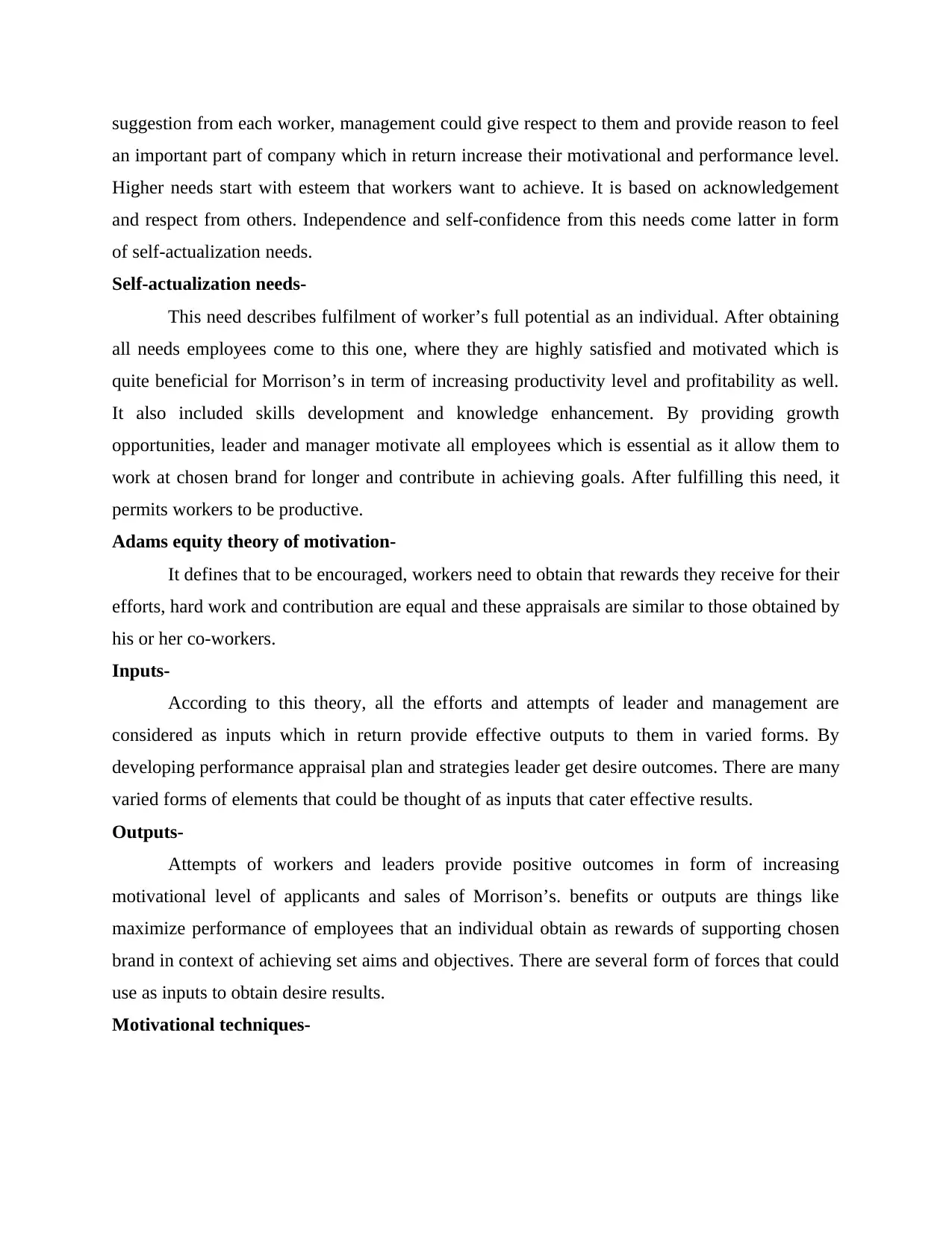
suggestion from each worker, management could give respect to them and provide reason to feel
an important part of company which in return increase their motivational and performance level.
Higher needs start with esteem that workers want to achieve. It is based on acknowledgement
and respect from others. Independence and self-confidence from this needs come latter in form
of self-actualization needs.
Self-actualization needs-
This need describes fulfilment of worker’s full potential as an individual. After obtaining
all needs employees come to this one, where they are highly satisfied and motivated which is
quite beneficial for Morrison’s in term of increasing productivity level and profitability as well.
It also included skills development and knowledge enhancement. By providing growth
opportunities, leader and manager motivate all employees which is essential as it allow them to
work at chosen brand for longer and contribute in achieving goals. After fulfilling this need, it
permits workers to be productive.
Adams equity theory of motivation-
It defines that to be encouraged, workers need to obtain that rewards they receive for their
efforts, hard work and contribution are equal and these appraisals are similar to those obtained by
his or her co-workers.
Inputs-
According to this theory, all the efforts and attempts of leader and management are
considered as inputs which in return provide effective outputs to them in varied forms. By
developing performance appraisal plan and strategies leader get desire outcomes. There are many
varied forms of elements that could be thought of as inputs that cater effective results.
Outputs-
Attempts of workers and leaders provide positive outcomes in form of increasing
motivational level of applicants and sales of Morrison’s. benefits or outputs are things like
maximize performance of employees that an individual obtain as rewards of supporting chosen
brand in context of achieving set aims and objectives. There are several form of forces that could
use as inputs to obtain desire results.
Motivational techniques-
an important part of company which in return increase their motivational and performance level.
Higher needs start with esteem that workers want to achieve. It is based on acknowledgement
and respect from others. Independence and self-confidence from this needs come latter in form
of self-actualization needs.
Self-actualization needs-
This need describes fulfilment of worker’s full potential as an individual. After obtaining
all needs employees come to this one, where they are highly satisfied and motivated which is
quite beneficial for Morrison’s in term of increasing productivity level and profitability as well.
It also included skills development and knowledge enhancement. By providing growth
opportunities, leader and manager motivate all employees which is essential as it allow them to
work at chosen brand for longer and contribute in achieving goals. After fulfilling this need, it
permits workers to be productive.
Adams equity theory of motivation-
It defines that to be encouraged, workers need to obtain that rewards they receive for their
efforts, hard work and contribution are equal and these appraisals are similar to those obtained by
his or her co-workers.
Inputs-
According to this theory, all the efforts and attempts of leader and management are
considered as inputs which in return provide effective outputs to them in varied forms. By
developing performance appraisal plan and strategies leader get desire outcomes. There are many
varied forms of elements that could be thought of as inputs that cater effective results.
Outputs-
Attempts of workers and leaders provide positive outcomes in form of increasing
motivational level of applicants and sales of Morrison’s. benefits or outputs are things like
maximize performance of employees that an individual obtain as rewards of supporting chosen
brand in context of achieving set aims and objectives. There are several form of forces that could
use as inputs to obtain desire results.
Motivational techniques-
Paraphrase This Document
Need a fresh take? Get an instant paraphrase of this document with our AI Paraphraser
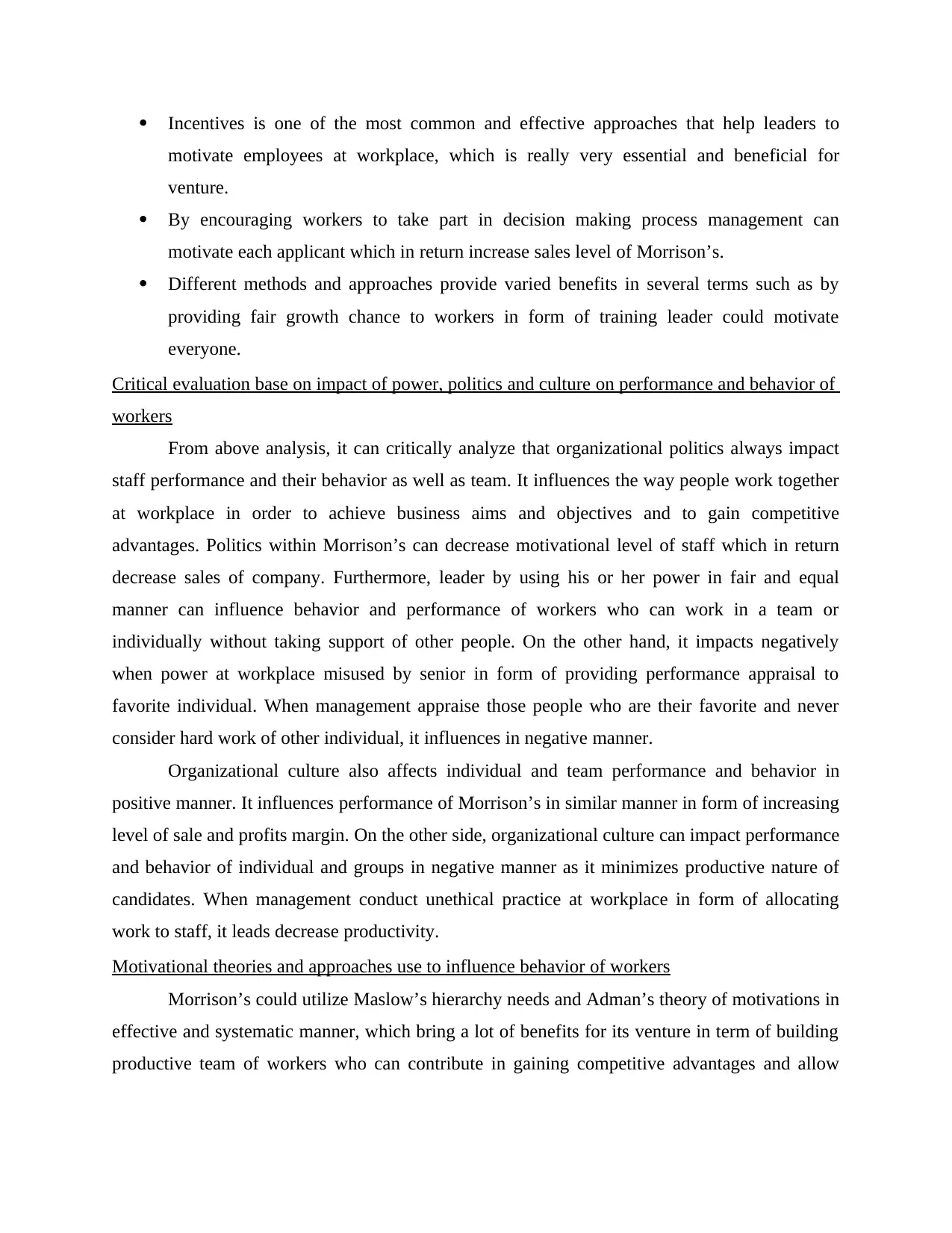
Incentives is one of the most common and effective approaches that help leaders to
motivate employees at workplace, which is really very essential and beneficial for
venture.
By encouraging workers to take part in decision making process management can
motivate each applicant which in return increase sales level of Morrison’s.
Different methods and approaches provide varied benefits in several terms such as by
providing fair growth chance to workers in form of training leader could motivate
everyone.
Critical evaluation base on impact of power, politics and culture on performance and behavior of
workers
From above analysis, it can critically analyze that organizational politics always impact
staff performance and their behavior as well as team. It influences the way people work together
at workplace in order to achieve business aims and objectives and to gain competitive
advantages. Politics within Morrison’s can decrease motivational level of staff which in return
decrease sales of company. Furthermore, leader by using his or her power in fair and equal
manner can influence behavior and performance of workers who can work in a team or
individually without taking support of other people. On the other hand, it impacts negatively
when power at workplace misused by senior in form of providing performance appraisal to
favorite individual. When management appraise those people who are their favorite and never
consider hard work of other individual, it influences in negative manner.
Organizational culture also affects individual and team performance and behavior in
positive manner. It influences performance of Morrison’s in similar manner in form of increasing
level of sale and profits margin. On the other side, organizational culture can impact performance
and behavior of individual and groups in negative manner as it minimizes productive nature of
candidates. When management conduct unethical practice at workplace in form of allocating
work to staff, it leads decrease productivity.
Motivational theories and approaches use to influence behavior of workers
Morrison’s could utilize Maslow’s hierarchy needs and Adman’s theory of motivations in
effective and systematic manner, which bring a lot of benefits for its venture in term of building
productive team of workers who can contribute in gaining competitive advantages and allow
motivate employees at workplace, which is really very essential and beneficial for
venture.
By encouraging workers to take part in decision making process management can
motivate each applicant which in return increase sales level of Morrison’s.
Different methods and approaches provide varied benefits in several terms such as by
providing fair growth chance to workers in form of training leader could motivate
everyone.
Critical evaluation base on impact of power, politics and culture on performance and behavior of
workers
From above analysis, it can critically analyze that organizational politics always impact
staff performance and their behavior as well as team. It influences the way people work together
at workplace in order to achieve business aims and objectives and to gain competitive
advantages. Politics within Morrison’s can decrease motivational level of staff which in return
decrease sales of company. Furthermore, leader by using his or her power in fair and equal
manner can influence behavior and performance of workers who can work in a team or
individually without taking support of other people. On the other hand, it impacts negatively
when power at workplace misused by senior in form of providing performance appraisal to
favorite individual. When management appraise those people who are their favorite and never
consider hard work of other individual, it influences in negative manner.
Organizational culture also affects individual and team performance and behavior in
positive manner. It influences performance of Morrison’s in similar manner in form of increasing
level of sale and profits margin. On the other side, organizational culture can impact performance
and behavior of individual and groups in negative manner as it minimizes productive nature of
candidates. When management conduct unethical practice at workplace in form of allocating
work to staff, it leads decrease productivity.
Motivational theories and approaches use to influence behavior of workers
Morrison’s could utilize Maslow’s hierarchy needs and Adman’s theory of motivations in
effective and systematic manner, which bring a lot of benefits for its venture in term of building
productive team of workers who can contribute in gaining competitive advantages and allow
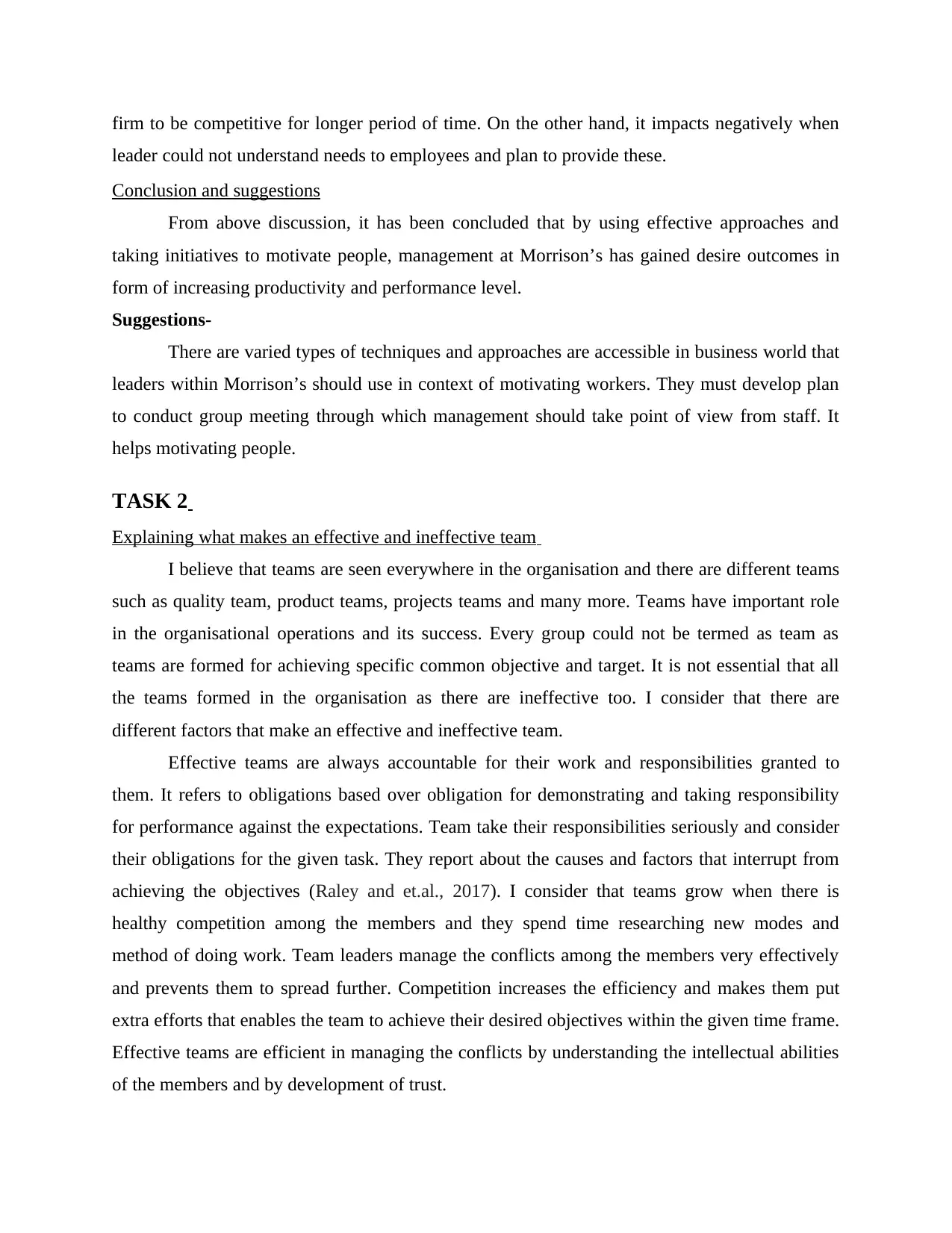
firm to be competitive for longer period of time. On the other hand, it impacts negatively when
leader could not understand needs to employees and plan to provide these.
Conclusion and suggestions
From above discussion, it has been concluded that by using effective approaches and
taking initiatives to motivate people, management at Morrison’s has gained desire outcomes in
form of increasing productivity and performance level.
Suggestions-
There are varied types of techniques and approaches are accessible in business world that
leaders within Morrison’s should use in context of motivating workers. They must develop plan
to conduct group meeting through which management should take point of view from staff. It
helps motivating people.
TASK 2
Explaining what makes an effective and ineffective team
I believe that teams are seen everywhere in the organisation and there are different teams
such as quality team, product teams, projects teams and many more. Teams have important role
in the organisational operations and its success. Every group could not be termed as team as
teams are formed for achieving specific common objective and target. It is not essential that all
the teams formed in the organisation as there are ineffective too. I consider that there are
different factors that make an effective and ineffective team.
Effective teams are always accountable for their work and responsibilities granted to
them. It refers to obligations based over obligation for demonstrating and taking responsibility
for performance against the expectations. Team take their responsibilities seriously and consider
their obligations for the given task. They report about the causes and factors that interrupt from
achieving the objectives (Raley and et.al., 2017). I consider that teams grow when there is
healthy competition among the members and they spend time researching new modes and
method of doing work. Team leaders manage the conflicts among the members very effectively
and prevents them to spread further. Competition increases the efficiency and makes them put
extra efforts that enables the team to achieve their desired objectives within the given time frame.
Effective teams are efficient in managing the conflicts by understanding the intellectual abilities
of the members and by development of trust.
leader could not understand needs to employees and plan to provide these.
Conclusion and suggestions
From above discussion, it has been concluded that by using effective approaches and
taking initiatives to motivate people, management at Morrison’s has gained desire outcomes in
form of increasing productivity and performance level.
Suggestions-
There are varied types of techniques and approaches are accessible in business world that
leaders within Morrison’s should use in context of motivating workers. They must develop plan
to conduct group meeting through which management should take point of view from staff. It
helps motivating people.
TASK 2
Explaining what makes an effective and ineffective team
I believe that teams are seen everywhere in the organisation and there are different teams
such as quality team, product teams, projects teams and many more. Teams have important role
in the organisational operations and its success. Every group could not be termed as team as
teams are formed for achieving specific common objective and target. It is not essential that all
the teams formed in the organisation as there are ineffective too. I consider that there are
different factors that make an effective and ineffective team.
Effective teams are always accountable for their work and responsibilities granted to
them. It refers to obligations based over obligation for demonstrating and taking responsibility
for performance against the expectations. Team take their responsibilities seriously and consider
their obligations for the given task. They report about the causes and factors that interrupt from
achieving the objectives (Raley and et.al., 2017). I consider that teams grow when there is
healthy competition among the members and they spend time researching new modes and
method of doing work. Team leaders manage the conflicts among the members very effectively
and prevents them to spread further. Competition increases the efficiency and makes them put
extra efforts that enables the team to achieve their desired objectives within the given time frame.
Effective teams are efficient in managing the conflicts by understanding the intellectual abilities
of the members and by development of trust.
⊘ This is a preview!⊘
Do you want full access?
Subscribe today to unlock all pages.

Trusted by 1+ million students worldwide
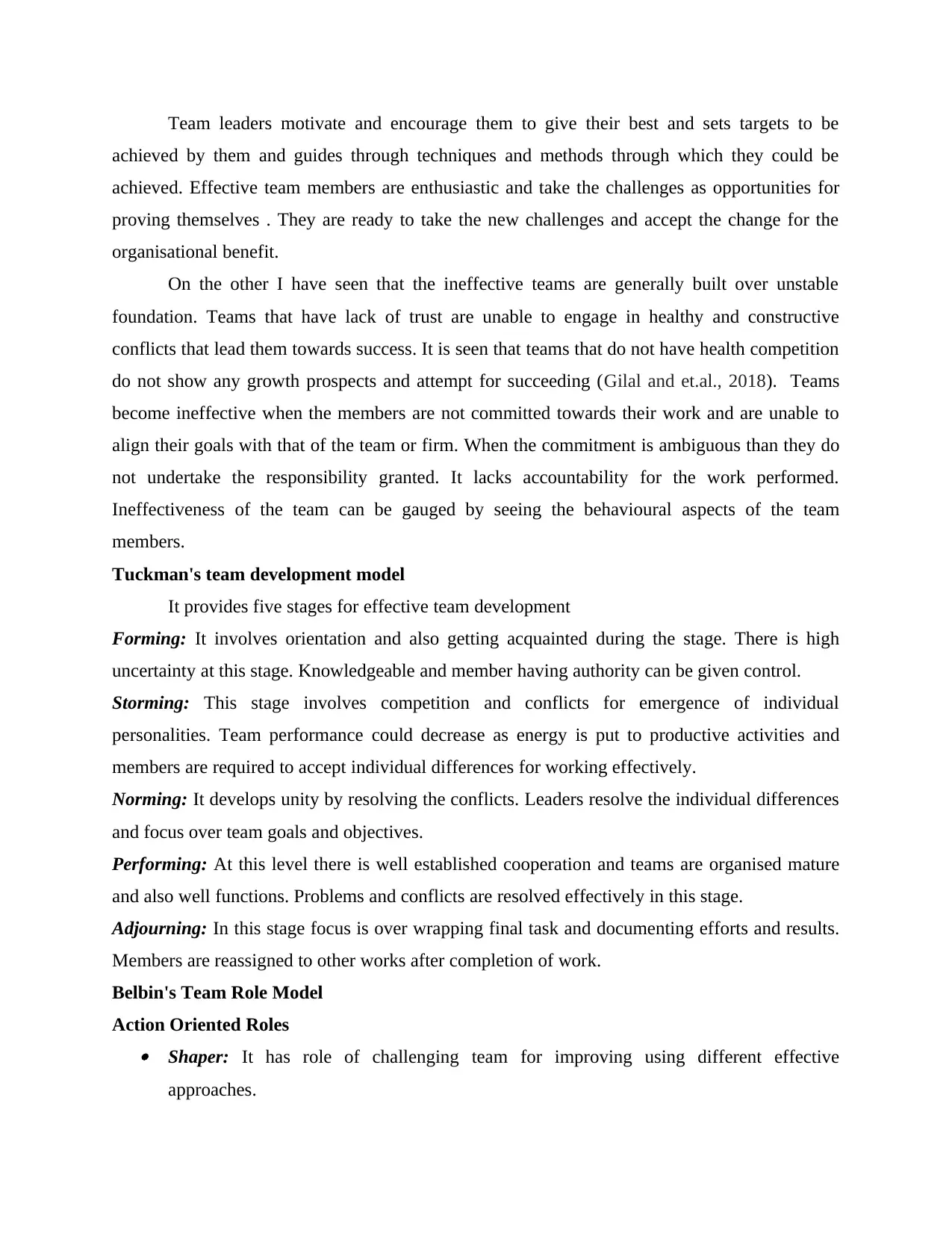
Team leaders motivate and encourage them to give their best and sets targets to be
achieved by them and guides through techniques and methods through which they could be
achieved. Effective team members are enthusiastic and take the challenges as opportunities for
proving themselves . They are ready to take the new challenges and accept the change for the
organisational benefit.
On the other I have seen that the ineffective teams are generally built over unstable
foundation. Teams that have lack of trust are unable to engage in healthy and constructive
conflicts that lead them towards success. It is seen that teams that do not have health competition
do not show any growth prospects and attempt for succeeding (Gilal and et.al., 2018). Teams
become ineffective when the members are not committed towards their work and are unable to
align their goals with that of the team or firm. When the commitment is ambiguous than they do
not undertake the responsibility granted. It lacks accountability for the work performed.
Ineffectiveness of the team can be gauged by seeing the behavioural aspects of the team
members.
Tuckman's team development model
It provides five stages for effective team development
Forming: It involves orientation and also getting acquainted during the stage. There is high
uncertainty at this stage. Knowledgeable and member having authority can be given control.
Storming: This stage involves competition and conflicts for emergence of individual
personalities. Team performance could decrease as energy is put to productive activities and
members are required to accept individual differences for working effectively.
Norming: It develops unity by resolving the conflicts. Leaders resolve the individual differences
and focus over team goals and objectives.
Performing: At this level there is well established cooperation and teams are organised mature
and also well functions. Problems and conflicts are resolved effectively in this stage.
Adjourning: In this stage focus is over wrapping final task and documenting efforts and results.
Members are reassigned to other works after completion of work.
Belbin's Team Role Model
Action Oriented Roles Shaper: It has role of challenging team for improving using different effective
approaches.
achieved by them and guides through techniques and methods through which they could be
achieved. Effective team members are enthusiastic and take the challenges as opportunities for
proving themselves . They are ready to take the new challenges and accept the change for the
organisational benefit.
On the other I have seen that the ineffective teams are generally built over unstable
foundation. Teams that have lack of trust are unable to engage in healthy and constructive
conflicts that lead them towards success. It is seen that teams that do not have health competition
do not show any growth prospects and attempt for succeeding (Gilal and et.al., 2018). Teams
become ineffective when the members are not committed towards their work and are unable to
align their goals with that of the team or firm. When the commitment is ambiguous than they do
not undertake the responsibility granted. It lacks accountability for the work performed.
Ineffectiveness of the team can be gauged by seeing the behavioural aspects of the team
members.
Tuckman's team development model
It provides five stages for effective team development
Forming: It involves orientation and also getting acquainted during the stage. There is high
uncertainty at this stage. Knowledgeable and member having authority can be given control.
Storming: This stage involves competition and conflicts for emergence of individual
personalities. Team performance could decrease as energy is put to productive activities and
members are required to accept individual differences for working effectively.
Norming: It develops unity by resolving the conflicts. Leaders resolve the individual differences
and focus over team goals and objectives.
Performing: At this level there is well established cooperation and teams are organised mature
and also well functions. Problems and conflicts are resolved effectively in this stage.
Adjourning: In this stage focus is over wrapping final task and documenting efforts and results.
Members are reassigned to other works after completion of work.
Belbin's Team Role Model
Action Oriented Roles Shaper: It has role of challenging team for improving using different effective
approaches.
Paraphrase This Document
Need a fresh take? Get an instant paraphrase of this document with our AI Paraphraser
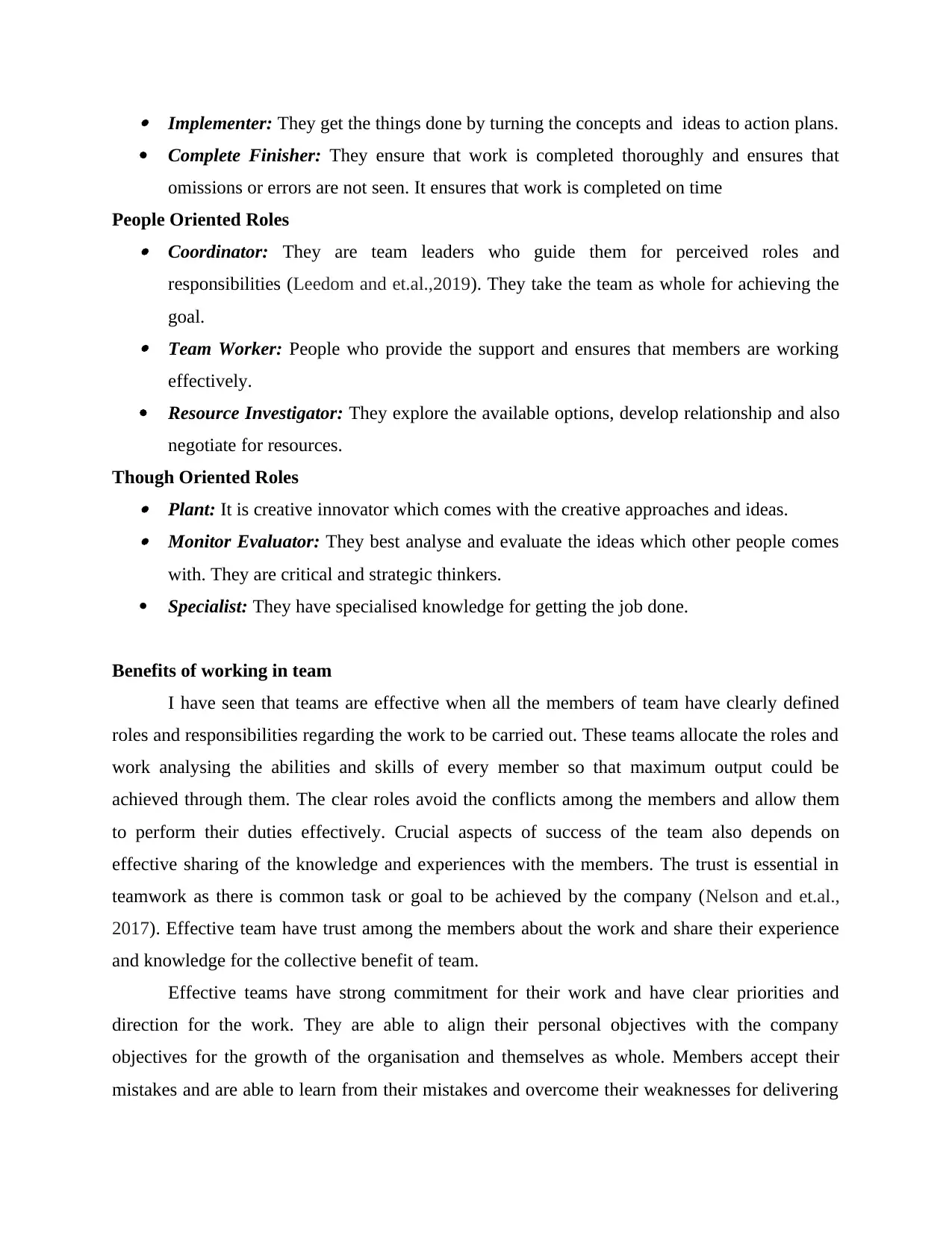
Implementer: They get the things done by turning the concepts and ideas to action plans.
Complete Finisher: They ensure that work is completed thoroughly and ensures that
omissions or errors are not seen. It ensures that work is completed on time
People Oriented Roles Coordinator: They are team leaders who guide them for perceived roles and
responsibilities (Leedom and et.al.,2019). They take the team as whole for achieving the
goal. Team Worker: People who provide the support and ensures that members are working
effectively.
Resource Investigator: They explore the available options, develop relationship and also
negotiate for resources.
Though Oriented Roles Plant: It is creative innovator which comes with the creative approaches and ideas. Monitor Evaluator: They best analyse and evaluate the ideas which other people comes
with. They are critical and strategic thinkers.
Specialist: They have specialised knowledge for getting the job done.
Benefits of working in team
I have seen that teams are effective when all the members of team have clearly defined
roles and responsibilities regarding the work to be carried out. These teams allocate the roles and
work analysing the abilities and skills of every member so that maximum output could be
achieved through them. The clear roles avoid the conflicts among the members and allow them
to perform their duties effectively. Crucial aspects of success of the team also depends on
effective sharing of the knowledge and experiences with the members. The trust is essential in
teamwork as there is common task or goal to be achieved by the company (Nelson and et.al.,
2017). Effective team have trust among the members about the work and share their experience
and knowledge for the collective benefit of team.
Effective teams have strong commitment for their work and have clear priorities and
direction for the work. They are able to align their personal objectives with the company
objectives for the growth of the organisation and themselves as whole. Members accept their
mistakes and are able to learn from their mistakes and overcome their weaknesses for delivering
Complete Finisher: They ensure that work is completed thoroughly and ensures that
omissions or errors are not seen. It ensures that work is completed on time
People Oriented Roles Coordinator: They are team leaders who guide them for perceived roles and
responsibilities (Leedom and et.al.,2019). They take the team as whole for achieving the
goal. Team Worker: People who provide the support and ensures that members are working
effectively.
Resource Investigator: They explore the available options, develop relationship and also
negotiate for resources.
Though Oriented Roles Plant: It is creative innovator which comes with the creative approaches and ideas. Monitor Evaluator: They best analyse and evaluate the ideas which other people comes
with. They are critical and strategic thinkers.
Specialist: They have specialised knowledge for getting the job done.
Benefits of working in team
I have seen that teams are effective when all the members of team have clearly defined
roles and responsibilities regarding the work to be carried out. These teams allocate the roles and
work analysing the abilities and skills of every member so that maximum output could be
achieved through them. The clear roles avoid the conflicts among the members and allow them
to perform their duties effectively. Crucial aspects of success of the team also depends on
effective sharing of the knowledge and experiences with the members. The trust is essential in
teamwork as there is common task or goal to be achieved by the company (Nelson and et.al.,
2017). Effective team have trust among the members about the work and share their experience
and knowledge for the collective benefit of team.
Effective teams have strong commitment for their work and have clear priorities and
direction for the work. They are able to align their personal objectives with the company
objectives for the growth of the organisation and themselves as whole. Members accept their
mistakes and are able to learn from their mistakes and overcome their weaknesses for delivering
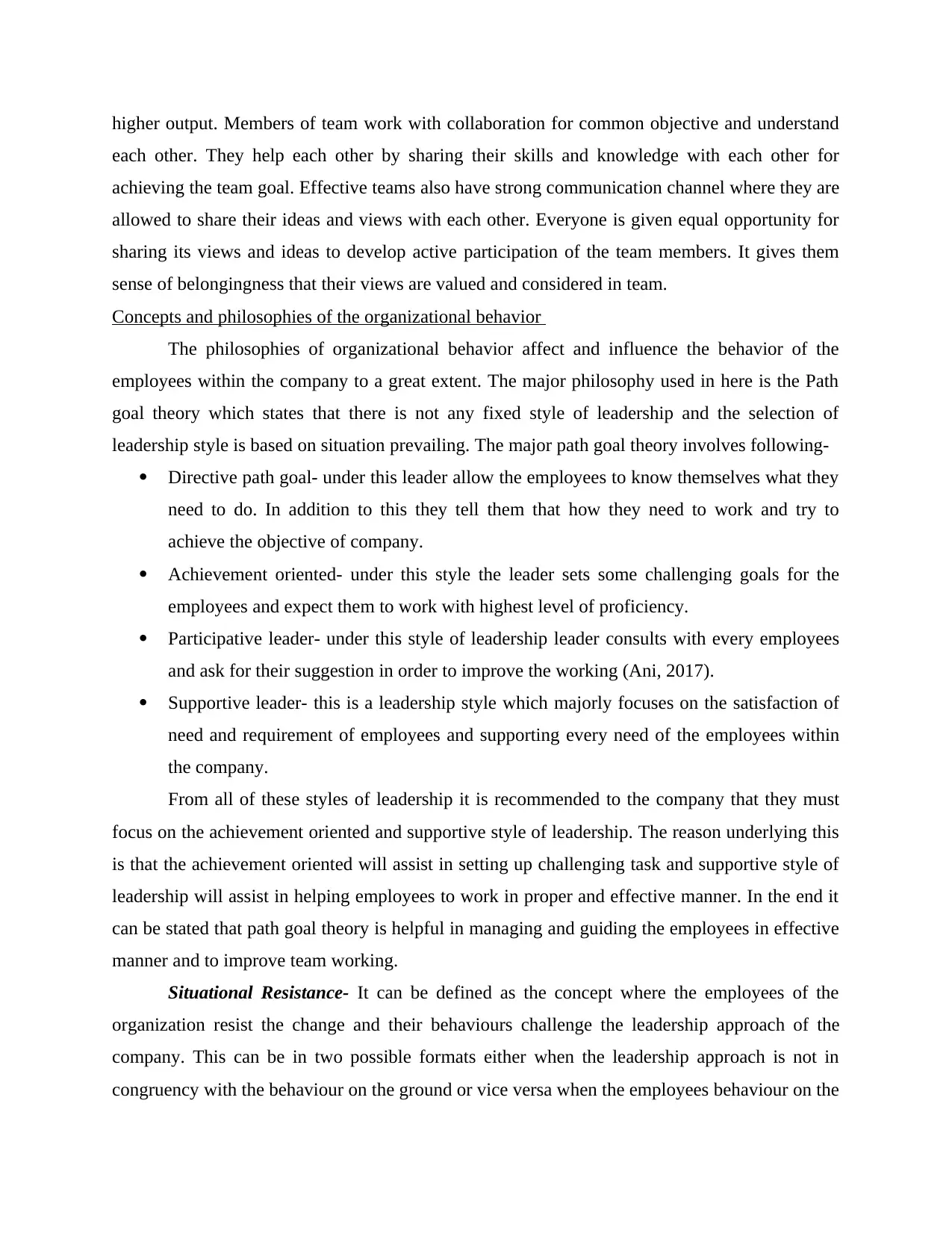
higher output. Members of team work with collaboration for common objective and understand
each other. They help each other by sharing their skills and knowledge with each other for
achieving the team goal. Effective teams also have strong communication channel where they are
allowed to share their ideas and views with each other. Everyone is given equal opportunity for
sharing its views and ideas to develop active participation of the team members. It gives them
sense of belongingness that their views are valued and considered in team.
Concepts and philosophies of the organizational behavior
The philosophies of organizational behavior affect and influence the behavior of the
employees within the company to a great extent. The major philosophy used in here is the Path
goal theory which states that there is not any fixed style of leadership and the selection of
leadership style is based on situation prevailing. The major path goal theory involves following-
Directive path goal- under this leader allow the employees to know themselves what they
need to do. In addition to this they tell them that how they need to work and try to
achieve the objective of company.
Achievement oriented- under this style the leader sets some challenging goals for the
employees and expect them to work with highest level of proficiency.
Participative leader- under this style of leadership leader consults with every employees
and ask for their suggestion in order to improve the working (Ani, 2017).
Supportive leader- this is a leadership style which majorly focuses on the satisfaction of
need and requirement of employees and supporting every need of the employees within
the company.
From all of these styles of leadership it is recommended to the company that they must
focus on the achievement oriented and supportive style of leadership. The reason underlying this
is that the achievement oriented will assist in setting up challenging task and supportive style of
leadership will assist in helping employees to work in proper and effective manner. In the end it
can be stated that path goal theory is helpful in managing and guiding the employees in effective
manner and to improve team working.
Situational Resistance- It can be defined as the concept where the employees of the
organization resist the change and their behaviours challenge the leadership approach of the
company. This can be in two possible formats either when the leadership approach is not in
congruency with the behaviour on the ground or vice versa when the employees behaviour on the
each other. They help each other by sharing their skills and knowledge with each other for
achieving the team goal. Effective teams also have strong communication channel where they are
allowed to share their ideas and views with each other. Everyone is given equal opportunity for
sharing its views and ideas to develop active participation of the team members. It gives them
sense of belongingness that their views are valued and considered in team.
Concepts and philosophies of the organizational behavior
The philosophies of organizational behavior affect and influence the behavior of the
employees within the company to a great extent. The major philosophy used in here is the Path
goal theory which states that there is not any fixed style of leadership and the selection of
leadership style is based on situation prevailing. The major path goal theory involves following-
Directive path goal- under this leader allow the employees to know themselves what they
need to do. In addition to this they tell them that how they need to work and try to
achieve the objective of company.
Achievement oriented- under this style the leader sets some challenging goals for the
employees and expect them to work with highest level of proficiency.
Participative leader- under this style of leadership leader consults with every employees
and ask for their suggestion in order to improve the working (Ani, 2017).
Supportive leader- this is a leadership style which majorly focuses on the satisfaction of
need and requirement of employees and supporting every need of the employees within
the company.
From all of these styles of leadership it is recommended to the company that they must
focus on the achievement oriented and supportive style of leadership. The reason underlying this
is that the achievement oriented will assist in setting up challenging task and supportive style of
leadership will assist in helping employees to work in proper and effective manner. In the end it
can be stated that path goal theory is helpful in managing and guiding the employees in effective
manner and to improve team working.
Situational Resistance- It can be defined as the concept where the employees of the
organization resist the change and their behaviours challenge the leadership approach of the
company. This can be in two possible formats either when the leadership approach is not in
congruency with the behaviour on the ground or vice versa when the employees behaviour on the
⊘ This is a preview!⊘
Do you want full access?
Subscribe today to unlock all pages.

Trusted by 1+ million students worldwide
1 out of 14
Related Documents
Your All-in-One AI-Powered Toolkit for Academic Success.
+13062052269
info@desklib.com
Available 24*7 on WhatsApp / Email
![[object Object]](/_next/static/media/star-bottom.7253800d.svg)
Unlock your academic potential
Copyright © 2020–2026 A2Z Services. All Rights Reserved. Developed and managed by ZUCOL.





